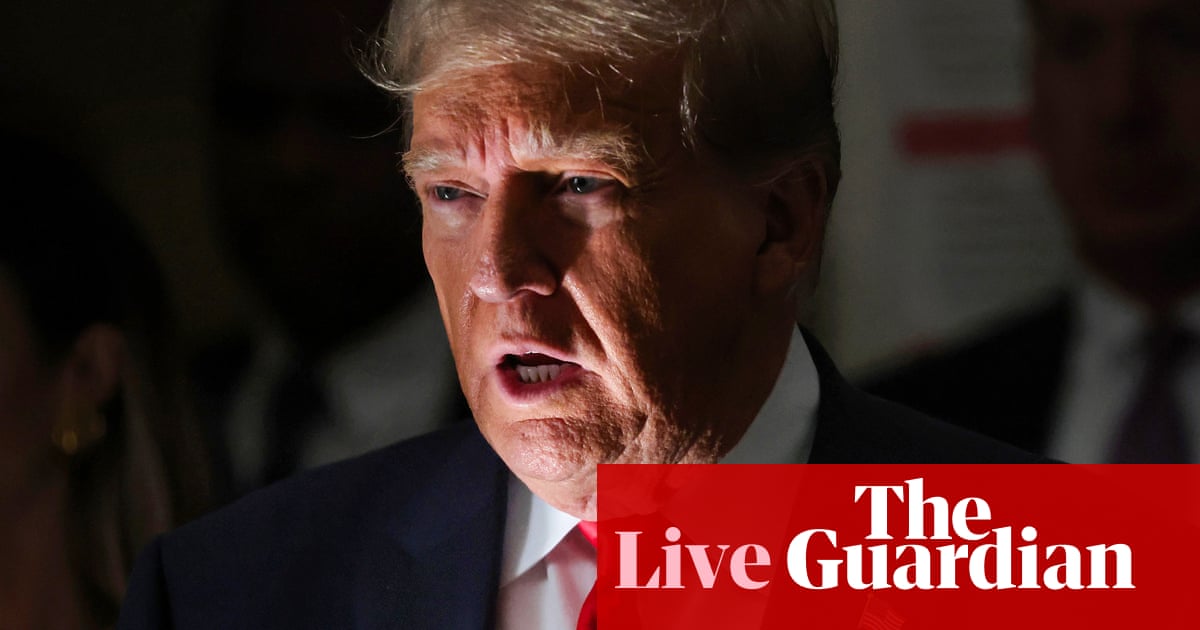Supreme court convenes to hear Trump election eligibility case
The supreme court has gathered and is soon expected to begin hearing arguments from both sides in the case over whether Donald Trump is eligible to run for president because of his involvement in the January 6 insurrection.
As Steve Vladeck, a law professor at the University of Texas, notes, the court won’t begin hearing the case immediately:
One listening note re: #SCOTUS:
The Court is *convening* at 10 ET, but it has other business to conduct before the Section 3 argument—including handing down one or more opinions in *other* cases—that will *not* be live-streamed.
So the actual live feed won’t start for a bit…
— Steve Vladeck (@steve_vladeck) February 8, 2024
Nor are the nine justices expected to announce their decision today. That is likely to come at some point in the future.
Key events
Chief justice John Roberts, a conservative, is asking Jason Murray about the precedent that would be set if Donald Trump is booted from the presidential ballot.
“What do you do with the, what would seem to be, the big plain consequences of your position? If Colorado’s position is upheld, surely there will be disqualification proceedings on the other side and some of those will succeed,” Roberts asked.
“In very quick order, I would expect, although my predictions never have been correct, I would expect that a goodly number of states will say whoever the Democratic candidate is, you’re off the ballot, and others, for the Republican candidate, you’re off the ballot. It will come down to just a handful of states that are going to decide the presidential election. That’s a pretty daunting consequence.”
Murray replied: “There is a reason section three has been dormant for 150 years, and it’s because we haven’t seen anything like January 6 since Reconstruction. Insurrection against the constitution is something extraordinary.”
Attorney for group trying to keep Trump off presidential ballots begins supreme court arguments
Donald Trump’s attorney Jonathan Mitchell has wrapped up his arguments before the supreme court.
Up next is Jason Murray, the attorney representing the Colorado voters who successfully sued to keep Trump off the state’s presidential ballot, and Norma Anderson, a former legislator in the state who signed on to the suit.
As he began his arguments, Murray said:
By engaging an insurrection against the constitution, President Trump disqualified himself from public office.
As we heard earlier, President Trump’s main argument is that this court should create a special exemption to section three that would apply to him and to him alone. He says section three disqualifies all oath-breaking insurrectionists, except a former president who never before held other state or federal office. There is no possible rationale for such an exemption, and the court should reject the claim that the framers made an extraordinary mistake. Section three uses deliberately broad language to cover all positions of federal power requiring an oath to the constitution. My friend relies on a claimed difference between an office under, and an officer of the United States, but this case does not come down to mere prepositions.
The two phrases are two sides of the same coin, referring to any federal office, or to anyone who holds one.
Under questioning from liberal justice Ketanji Brown Jackson, Donald Trump’s attorney Jonathan Mitchell was asked to weigh in on whether January 6 was an insurrection.
After some back and forth, Mitchell said:
This was a riot. It was not an insurrection. The events were shameful, criminal, violent, all of those things, but did not qualify as insurrection as that term is used in section three.
One of the arguments being made by Donald Trump’s attorney Jonathan Mitchell is that the president is not an “officer of the United States”, the role that section three of the 14th amendment singles out for disqualification.
Liberal justice Sonia Sotomayor wanted to know more about that.
“Your principal argument is that the president is not an officer of the United States, correct?” Sotomayor asked, to which Mitchell responded in the affirmative, while noting he would make his argument “a little more forcefully”.
Before he could continue, Sotomayor interjected, wondering if Mitchell’s view wasn’t “gerrymandered” and “designed to benefit only your client”.
“I certainly wouldn’t call it a gerrymander. That implies nefarious intent,” Mitchell replied.
The justices are taking turns bouncing questions off Jonathan Mitchell, the former Texas solicitor general who is representing Donald Trump.
After a lengthy period of silence, conservative justice Brett Kavanaugh just asked his first question. We still haven’t heard anything from his fellow conservative Neil Gorsuch. All the other justices have had the chance to spar with Mitchell.
The plaintiffs trying to keep Donald Trump off presidential ballots are citing section three of the constitution’s 14th amendment, which bans people from federal elected office who have sworn an oath to support the constitution and who “have engaged in insurrection or rebellion”.
At issue is whether that clause is self-executing, as in, whether or not Congress must pass a law to enforce it. Trump attorney Jonathan Mitchell was asked by conservative justice Clarence Thomas if section three was self-executing, and replied:
There would not be any role for the states in enforcing section three, unless Congress were to enact a statute that gives them that authority.
Jonathan Mitchell, a lawyer for Donald Trump, is up first as the supreme court begins hearing the case.
“The Colorado supreme court’s decision is wrong and should be reversed for numerous independent reasons,” Mitchell said.
By a 4-3 vote, the Colorado supreme court booted Trump from the state’s presidential ballot, a ruling that the former president is appealing.
The US supreme court may decide the case in many ways, but it’s possible that they issue a broad ruling addressing the question of Trump’s eligibility in the various states where it is being challenged.
Supreme court convenes to hear Trump election eligibility case
The supreme court has gathered and is soon expected to begin hearing arguments from both sides in the case over whether Donald Trump is eligible to run for president because of his involvement in the January 6 insurrection.
As Steve Vladeck, a law professor at the University of Texas, notes, the court won’t begin hearing the case immediately:
One listening note re: #SCOTUS:
The Court is *convening* at 10 ET, but it has other business to conduct before the Section 3 argument—including handing down one or more opinions in *other* cases—that will *not* be live-streamed.
So the actual live feed won’t start for a bit…
— Steve Vladeck (@steve_vladeck) February 8, 2024
Nor are the nine justices expected to announce their decision today. That is likely to come at some point in the future.

Hugo Lowell
I’m at the supreme court for today’s hearing, and spotted Jason Miller, a top aide to Donald Trump, entering the building.
While the former president has sat in for some of his court hearings, such as the defamation lawsuit brought against him by author E Jean Carroll, and his arraignments on the state and federal charges brought against him, he is not expected to be here today.
The supreme court is far from the only tribunal considering Donald Trump’s fate.
While the issue they’re weighing is constitutional, the former president is facing dozens of criminal charges spread over four indictments, as well as several civil suits.
We have a newsletter that covers the latest in all these cases, and you can sign up for it below:
What to watch for as supreme court considers if Trump is eligible to run
From the Guardian’s Cameron Joseph, here’s a primer of what to watch for as the supreme court hears arguments today over whether or not Donald Trump is eligible to run for president, because of his involvement in the January 6 insurrection.
The case is one of the most politically charged the court has ever faced, and there’s plenty of speculation over how the body, which is dominated by its six-justice conservative majority, will rule:
The US supreme court meets today to hear oral arguments on whether the 14th amendment of the constitution bars the former president Donald Trump from appearing on the ballot in Colorado and other states because of his role in the January 6 Capitol riot. The case is unprecedented: the clause has rarely been used since it became part of the constitution after the civil war in 1868, and it has never before been applied to a former president.
The oral arguments are expected to be something of a free-for-all, with nine justices asking about a bevy of unresolved constitutional issues. And the justices’ questions on Thursday could hint at exactly how they might rule.
What they have been asked to decide is whether Trump should not be allowed to run for president because of section three of the 14th amendment, which says no one who has taken an oath to support the constitution – typically administered when elected officials are sworn into office – and goes on to engage “in insurrection or rebellion” against the US, is allowed to hold public office again.
Many legal scholars and former government officials have made the case in briefs that the plain language of the amendment applies to Trump, but few expect the supreme court to, in effect, decide the 2024 election by disqualifying one of the main candidates. Court watchers suspect that they would rather not hear the case at all – and may seek to make as narrow a ruling as possible.
Supreme court to consider case that could bar Trump from presidency over January 6
Good morning, US politics blog readers. Beginning at 10am ET today, the supreme court will hear arguments in a case that could decide if Donald Trump is eligible to continue his run for president. A legal effort to keep the former president off ballots nationwide began last year, when advocacy groups filed lawsuits in various states, arguing the constitution bars Trump from serving because he engaged in an insurrection on January 6. State officials and judges in lower courts have come to different conclusions on the merits of these claims, but the most notable decision was rendered by the Colorado supreme court, which agreed with the plaintiffs and threw him off the state’s ballot. Trump appealed that ruling, and the nine justice of the nation’s highest court will consider the issue today.
The supreme court is dominated by its six-member conservative supermajority, three of whom Trump appointed. Today’s arguments will give a hint of how they’re thinking about an issue that legal scholars view as the most contentious political issue the court has waded into since Bush v Gore in 2000, the case that proved decisive in George W Bush winning that year’s presidential election. We’ll cover the arguments live here, and let you know how it’s looking.
Here’s what else is happening:
-
Haggling continues in Congress over passing legislation to provide Ukraine and Israel with military assistance. The ball is now in the Senate’s court, where Democrats are attempting to pass legislation to do that, but it is still unclear if Republicans will sign on.
-
Robert Hur, the special counsel appointed to investigate if Joe Biden mishandle classified documents, told attorney general Merrick Garland that he has completed his investigation, the Associated Press reports.
-
Marianne Williamson, a long-shot Democratic candidate, has dropped out of the race for president.







